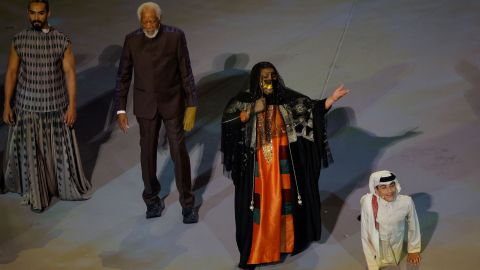Why Arabs and Muslims feel stung by coverage of the Qatar World Cup
Editor’s Note: A version of this story first appeared in CNN’s Meanwhile in the Middle East newsletter, a three-times-a-week look inside the region’s biggest stories. Sign up here.
Abu Dhabi, UAE
CNN
—
“Today I feel Qatari. Today I feel Arab. Today I feel African. Today I feel gay. Today I feel disabled. Today I feel a migrant worker,” FIFA chief Gianni Infantino said in a fiery tirade on Saturday, comparing his own plight as a redhead son of migrants to that of marginalized communities.
His ostensible empathy with Qatar was due to the barrage of criticism the nation has faced in Western media for hosting the tournament.
But it’s hypocritical of the West to be giving lessons in morality to others, he said.
Those statements on the eve of the World Cup went viral, inviting much anger and ridicule. But to many Arabs and Muslims, they resonated strongly.

Omar Alsaadi, a 21-year-old Qatari, told CNN that Infantino vocalized “from a Western point of view” what many of his compatriots have felt about being targets of racism.
In the run-up to the tournament, Western media coverage has been dominated by the controversies surrounding the event rather than the sport itself, including the Gulf nation’s treatment of migrant workers, its rules on LGBTQ people and its tight social restrictions. Britain’s public broadcaster, the BBC, refrained from airing the opening ceremony on television, opting instead to cover criticism of the host nation. The BBC said it did broadcast the ceremony on their video-on-demand service.
This year’s World Cup is certainly like no other before it. It is the first to be held in a Muslim country and Qatar has gone a long way to give the event a distinctly Arab and Muslim flavor.
The Bedouin-themed opening ceremony on Sunday began with a female singer donning a traditional burqa, a kind of face covering that has been banned in several European countries. It also cited a verse from the Quran about God creating humanity into “nations and tribes” so they can get to know each other.
According to social media reports, some hotel rooms in the country offer visitors QR codes to learn about Islam, and Muslim volunteers have been teaching visitors about Islamic fashion.
Qatar’s Supreme Committee for Delivery & Legacy (SC), which is responsible for overseeing the infrastructure projects and planning for the World Cup, didn’t respond to CNN’s request for comment.
But in an earlier statement to CNN, the SC said it was committed to “an inclusive and discriminatory-free” World Cup.
“Everyone is welcome in Qatar, but we are a conservative country and any public display of affection, regardless of…
Read More: Why Arabs and Muslims feel stung by coverage of the Qatar World Cup 2022-11-24 00:23:00
